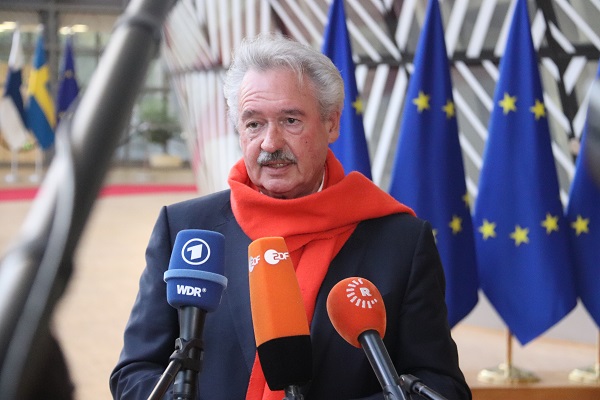 Jean Asselborn, Luxembourg's Minister for Immigration and Asylum;
Credit: MAEE
Jean Asselborn, Luxembourg's Minister for Immigration and Asylum;
Credit: MAEE
On Friday 25 November 2022, Luxembourg's Minister for Immigration and Asylum, Jean Asselborn, took part in the extraordinary Justice and Home Affairs Council of the European Union (EU) in Brussels.
Following the discussions related to the landing of the Ocean Viking humanitarian ship, the Czech Presidency of the Council of the EU wanted to bring together the ministers in charge of migration to address the challenges that arise on the different migratory routes. The European Commission, represented by Commissioners Margaritis Schinas and Ylva Johansson, has drawn up a complete inventory of the routes which confirms a strong upsurge in migratory pressure, in particular on the Central Mediterranean route and on the Western Balkan route.
The Commission then presented its action plan on the Central Mediterranean route which it adopted this week and which includes a total of 20 actions based on three pillars. The first pillar concerns the external dimension and provides for the development of cooperation with third countries and international organisations, while the second pillar proposes a coordinated approach to rescue at sea. Finally, the third pillar concerns a strengthened implementation of the voluntary solidarity mechanism adopted in June and of the joint roadmap of the Council and the European Parliament in order to complete the pact on migration and asylum by the end of the legislature.
In his speech, Minister Asselborn made a point of highlighting three questions likely to guide the discussion: "First, do we still want to save the lives of people shipwrecked at sea? I think all 27 would say yes. Second, are we then prepared to respect all the provisions of international law? Thirdly, do we have the strength to look back on the asylum and migration pact and are we able to reach a consensus? If this is not the case, the European Union risks stumbling from crisis to crisis, and will not find a solution to be able to manage migratory flows".
Minister Asselborn also recalled that Italy and France (between which tensions have arisen recently over illegal migration) are "pillars of European construction", adding that it is "not in our interest to disperse energy to close ports and to provoke odysseys before being able to disembark the rescued persons". He added: "The European Union is under an obligation to rescue people in distress and must subsequently guarantee access to an asylum procedure. It is about positive European and international law".
Having expressed his support for the action plan presented by the European Commission, Luxembourg's Immigration Minister reiterated that "there is no alternative to fair burden-sharing". For its part, Luxembourg has relocated 656 migrants since 2015, including 283 from Italy.
During the tour de table that followed, the Member States of the Mediterranean Basin asked for more solidarity in order to be able to welcome people arriving by sea.








